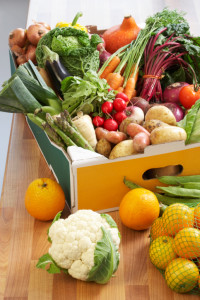 Vegetarian and vegan diets are becoming more prevalent in Western culture. Devotees of this lifestyle are motivated by numerous factors. Upbringing, health concerns, treatment of animals and religious reasons are all influences.
Vegetarian and vegan diets are becoming more prevalent in Western culture. Devotees of this lifestyle are motivated by numerous factors. Upbringing, health concerns, treatment of animals and religious reasons are all influences.
Vegetarianism vs. Veganism
There are a number of overlapping beliefs and preferences among vegetarians and vegans, but there are also differences. Neither consumes meat, including poultry, beef and pork. Vegans are considered “strict vegetarians” and take things a step further. They also avoid all dairy products like milk and egg as well as items made from animal skins like clothing and shoes.
Religious Beliefs
People of all different spiritual beliefs practice vegetarianism and veganism, but these choices are more closely associated with certain religions.
- Seventh-Day Adventists
Seventh-day Adventists have believed in a vegetarian diet for more than a century. After tobacco and alcohol, they feel meat is the third worst thing that people can consume. They believe health is a gift from God and following a vegetarian diet is conducive to a robust life.
- Unitarian Universalists
Unitarian Universalists believe in compassion for animals and that procuring meat, eggs and other dairy products raise ethical questions and can cause harm to animals. They also embrace the philosophy of being “kind” to the planet and that avoiding meat will contribute to a reduction of harmful greenhouse gases.
- Buddhists
Depending on which school of Buddhism individuals subscribe, animal flesh may or may not be a part of their diet. One of the tenets of Buddhism is “I undertake the precept to refrain from taking life.” Some Buddhists believe that this implies that they should not kill animals. Other Buddhists feel it is acceptable to consume meat if it is not specifically slaughtered for them.
What the Bible Says
The Bible is sometimes used in the religious debate about vegetarianism and veganism. Two frequently referenced scripture passages believed to support vegetarian/vegan diets are listed below:
- Genesis 1:29-30
Then God said, “I give you every seed-bearing plant on the face of the whole earth and every tree that has fruit with seed in it. They will be yours for food. 30 And to all the beasts of the earth and all the birds in the sky and all the creatures that move along the ground—everything that has the breath of life in it—I give every green plant for food.”
- Daniel 1:11-16
Daniel then said, “Please test your servants for ten days: Give us nothing but vegetables to eat and water to drink. 13 Then compare our appearance with that of the young men who eat the royal food, and treat your servants in accordance with what you see.”
Replacing Key Nutrients
There are a number of essential nutrients that must be replaced if you are following a vegetarian or vegan diet.
- Protein
Your body needs protein to repair and build tissues and to make enzymes and hormones. Meat and dairy products are top sources of this essential nutrient. Others foods high in protein are beans, legumes, nuts, tofu and quinoa.
- Calcium
Calcium is important for building healthy bones and teeth. Dairy products are popular choices for calcium, and they are not a part of the diet of many vegetarians and vegans. Leafy greens and legumes also contain calcium. There are also calcium-fortified foods such as breakfast cereals.
- Iron
Iron is a critical component of hemoglobin, which transports the oxygen in your blood to the cells in your body. Meat is a top source of iron. Legumes, kale, broccoli and nuts are other alternatives.
- B-12
People need B-12 for red blood cell growth, and meat and dairy products are the some of the most popular foods with this vitamin. Vegetarians and vegans can also find it in vegan cheese and yogurt, and fortified cereals.
Following a vegetarian or vegan diet is the best option for many people. If you do make this choice, be sure to consume all the nutrients you need to stay healthy from other sources.

